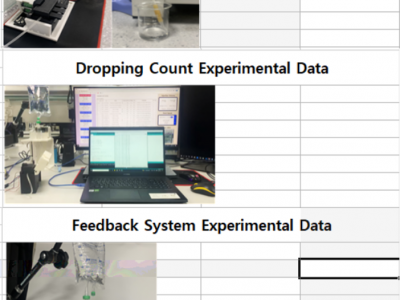Biomedical and Health Sciences
We submitted the paper Automatic Control System for Precise Intravenous Therapy using Computer Vision-Based on Deep Learning and provide experimental data related to this.
The purpose of this paper is to improve the accuracy of intravenous (IV) infusion using artificial intelligence and feedback loops to prevent errors in the process of administering IV Therapy, and we applied the system we developed to achieve the goal.
Therefore, we applied the system sequentially while creating a prototype and provide the data obtained through experiments.
- Categories:
 49 Views
49 ViewsSet of samples resulting from an evaluative, population-based cross-sectional study, approved by the Research Ethics Committee of Federal University of Alfenas, protocol: 415856. These samples pertain to 1,027 rural workers from the southern region of Minas Gerais, Brazil, where comprehensive data on socioeconomic factors, history of pesticide intoxication and hospitalization, and usage of personal protective equipment were collected. Blood samples were obtained to measure biomarkers of pesticide exposure as well as indicators of renal and hepatic sequelae.
- Categories:
 770 Views
770 Views
This dataset includes data from 43 hospitalized patients with type 2 diabetes mellitus. Dexcom G5 and Dexcom G6 mobile continuous glucose measurement (CGM) devices were used to measure continuous blood glucose levels. The data collection period is from April 2019 to January 2022. We selected 43 patients whose records with a more extended recording period of more than seven days. Data was collected for 7 to 10 days at 5-minute intervals. This data can be used for glucose level prediction or hypoglycemia occurrence prediction for patient with type 2 diabetes mellitus.
- Categories:
 1598 Views
1598 ViewsThe demand for artificial intelligence (AI) in healthcare is rapidly increasing. However, significant challenges arise from data scarcity and privacy concerns, particularly in medical imaging. While existing generative models have achieved success in image synthesis and image-to-image translation tasks, there remains a gap in the generation of 3D semantic medical images. To address this gap, we introduce Med-DDPM, a diffusion model specifically designed for semantic 3D medical image synthesis, effectively tackling data scarcity and privacy issues.
- Categories:
 2875 Views
2875 ViewsThe accurate placement of a needle into the spinal column is critical for spinal anesthesia, spinal taps, and other spinal procedures. Currently, the insertion of the needle is guided by visual and palpation feedback, which can be limited in accuracy and reliability. This study presents a novel approach to providing tactile feedback during needle insertion into the spinal column. This study aims to investigate the effectiveness of providing feedback during the insertion of a needle into the epidural column.
- Categories:
 301 Views
301 ViewsWe present a sEMG signal database corresponding to the Indian population named “ElectroMyography Analysis of Human Activities - DataBase -2 (EMAHA-DB2).” This data set consists of two different weight training activities which involve isotonic and isometric contractions. Weight training activities are effective for improving muscle strength, overall health, and regaining limb functionality for people undergoing rehabilitation post stroke-related episodes. The EMG signals acquired during weight training can be used for muscle recruitment analysis.
- Categories:
 892 Views
892 ViewsThis article provides an introduction to the field of datasets, including their types, characteristics, and applications. Datasets refer to collections of data that have been organized for specific purposes. They can come in various forms, including structured data, unstructured data, and semi-structured data. Each type of dataset has its own unique characteristics and uses. For example, structured data typically includes datasets that have been organized into tables and rows, such as spreadsheets or databases, while unstructured data typically includes text, images, and videos.
- Categories:
 349 Views
349 Views
- Categories:
 417 Views
417 Views
<p> The dataset is digital health data. It contains heart rate data extracted from Fitbit version 2 smartwatch worn by a healthy male Asian person of 48 years old. Data is of one-month duration. We have uploaded a zip file that contains data from different days. Data for each day has a separate file. The file name contains the date. Each file is in csv format. Each file has two columns – timestamp and heart rate. It is a continuous time-series heart rate data. Heart rate was recorded seamlessly at 5 sec interval. However, there may be missing datum.
- Categories:
 3501 Views
3501 Views



